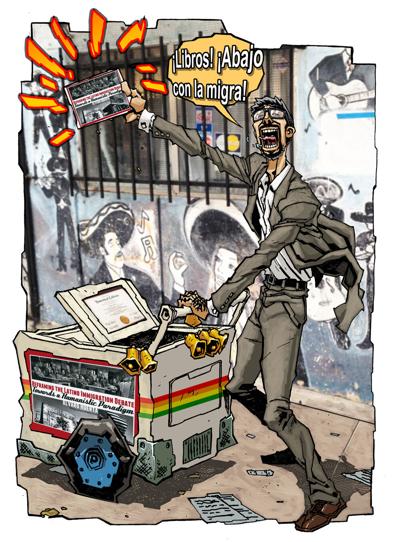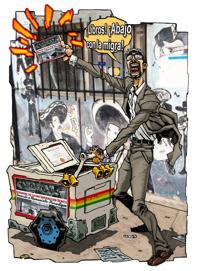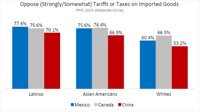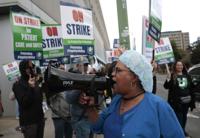
As a U.S.-born citizen of Mexican origin, as the saying goes, I constantly feel like a foreigner in my own land. During these dark times, when Brown people—my people—are being targeted, kidnapped and imprisoned by ICE bounty hunters, I feel like I’m living in a “cage with golden bars,” to quote from a classic scene of the 1987 movie, “Barfly,” about the late poet Charles Bukowski.
While I’m expertly aware that millions of people from around the world incur high risks and costs, which includes separation from their families and motherlands, to reside in the U.S., how can I be proud of my citizenship when the most vulnerable among us, especially marginalized Brown and Black people on the move, are constantly being criminalized by the U.S. government and its cruel agents?
As the U.S. government is inhumanly deporting Brown people today, during the late 1800s and early 1900s, the government welcomed millions of Europeans arriving at Ellis Island while fleeing poverty, violence and despair. These desperate European immigrants experienced similar factors that have historically forced people to migrate, as I spoke about in my 2015 TEDx talk.
I wonder if Emma Lazarus's poetic words, as inscribed on the Statue of Liberty’s plague, “Give me your tired, your poor, Your huddled masses yearning to breathe free,” only apply to White people?
Since anti-Mexicanism in El Norte has become an American pastime—from the U.S. imperialist invasion of Mexico to the Texas Rangers’ lynching of Mexicans to the Mexican Repatriation (mass deportations) during the early 1900s to “Operation Wetback” (mass deportations, once again) during the mid-1900s and much more—the late historian Dr. Juan Gómez-Quiñones helps us understand this term in his brilliant 2017 essay: “U.S. anti-Mexicanism is a race premised set of historical and contemporary ascriptions, convictions and discriminatory practices inflicted on persons of Mexican descent, longstanding and pervasive in the United States.”
For Brown people, this isn’t the time to live in fear. This is what the neo-fascists and White nationalists desire. For them, it’s about the oppression and control of Brown people.
In the case of U.S.-born children of Brown immigrants, we must speak out on behalf of our parents and extended family members who sacrifice daily so we could benefit from opportunities (educational, professional, etc.) that they lacked in their motherlands. For instance, thanks to my immigrant parents who lacked formal education in Mexico and toiled in low-paying, laborious and hazardous jobs in the U.S., like millions of their paisanos, I had the opportunity to secure advanced degrees from UC Berkeley (Ph.D.) and UCLA (B.A., M.A.). For three years, I also had the opportunity to teach and mentor graduate students at Harvard Divinity School.
Hence, as a Chicano scholar-activist, I have a moral obligation to use my privilege in defense of los de abajo. While I’m aware that my elite degrees and academic accomplishments will not shield me from the enforcers of racial capitalism, given the terror that my community is currently suffering, I reflect on what the late Hon. John Lewis taught about engaging in "good trouble."
Finally, let’s all learn from the heroic words attributed to Joe Hill—the labor activist, songwriter and member of the Industrial Workers of the World (IWW)—before being executed by the state: "Don't mourn, organize!"











(0) comments
Welcome to the discussion.
Log In
Keep it Clean. Please avoid obscene, vulgar, lewd, racist or sexually-oriented language.
PLEASE TURN OFF YOUR CAPS LOCK.
Don't Threaten. Threats of harming another person will not be tolerated.
Be Truthful. Don't knowingly lie about anyone or anything.
Be Nice. No racism, sexism or any sort of -ism that is degrading to another person.
Be Proactive. Use the 'Report' link on each comment to let us know of abusive posts.
Share with Us. We'd love to hear eyewitness accounts, the history behind an article.